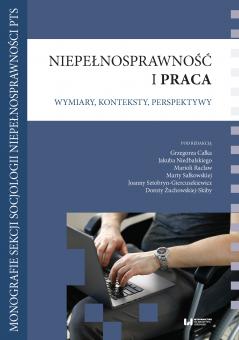Aktywność prozawodowa uczestników warsztatów terapii zajęciowej – szanse, wyzwania i dylematy
Abstract
Konwencja o prawach osób niepełnosprawnych wskazała nowe kierunki działań dotyczących aktywizacji zawodowej osób z niepełnosprawnościami. Skoncentrowanie na otwartym rynku pracy stawia pytania o rolę takich placówek, jak warsztaty terapii zajęciowej (dalej: WTZ) i wymaga określenia nowego sprofilowania działania tych podmiotów także w obszarze wspierania aktywności prozawodowej ich uczestników. W odpowiedzi na potrzebę określenia i doprecyzowania kierunków działań w tym zakresie w ramach systemowego projektu „Aktywni niepełnosprawni – narzędzia wsparcia samodzielności osób niepełnosprawnych” wypracowane zostały nowe „Standardy funkcjonowania Warsztatów Terapii Zajęciowej”. Celem artykułu jest zaprezentowanie wyników prowadzonych przez autorki badań ewaluacyjnych pilotażu wdrażania standardu w WT Z. Pokazano liczne uwarunkowania skuteczności działań z tym związanych. Mają one charakter zarówno zewnętrzny, jak i wewnętrzny. Wyniki prezentowanych badań mogą być przyczynkiem do dalszej dyskusji nad faktycznym miejscem WTZ w systemie aktywizacji zawodowej osób z niepełnosprawnościami z uwzględnieniem kierunków wynikających z konwencji. W artykule zaprezentowano niepublikowane wyniki badań ewaluacyjnych pilotażowego wdrażania standardów w WT Z przeprowadzonych w latach 2022–2023 w 72 wybranych warsztatach na terenie całego kraju. Badanie ewaluacyjne prowadzone były na zlecenie Polskiego Stowarzyszenia na Rzecz Osób z Niepełnosprawnością Intelektualną. The Convention on the Rights of Persons with Disabilities indicated new directions of activities regarding the professional activation of people with disabilities. Focusing on the open labor market raises questions about the role of institutions such as occupational therapy workshops (hereinafter: WTZ) and requires defining a new profile of the activities of these entities also in the area of supporting the pro- -vocational activity of their participants. In response to the need to define and clarify the directions of activities in this area, new „Standards for the operation of Occupational Therapy Workshops” have been developed as part of the systemic project „Active disabled people – tools to support the independence of disabled people”. They clearly define the role of WTZ, which is to support in achieving the maximum possible degree of independent living mainly through two paths: professionalization of the participant and social inclusion.. They are entirely oriented towards the subjectivity and self-determination of WTZ participants. The aim of the article is to present the results of evaluation studies conducted by the authors on the pilot implementation of the Standard in WTZ in the dimension related to their pro- -professional role. Research has shown numerous determinants of the effectiveness of related activities. They are both external and internal in nature. The results of the presented research may be a contribution to further discussion on the actual place of WTZ in the system of professional activation of people with disabilities, considering the directions resulting from the Convention. The article concerns unpublished results of evaluation studies of the pilot implementation of the Standards in WTZs in 72 selected workshops throughout the country, which were carried out in 2022–2023. The evaluation study was conducted on behalf of the Polish Association for People with Intellectual Disabilities.
Collections


